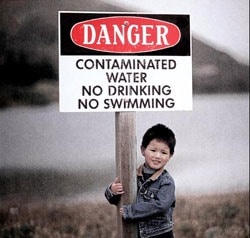The Environmental Integrity Project (EIP) has once again put together a fantastic report regarding water contamination near coal ash disposal sites.
Last year, the EIP released several reports showing that drinking water near coal ash disposal sites in states across America contained dangerous levels of heavy metals and other toxins, including arsenic. In total, last year’s report revealed 53 sites in the United States where coal ash had polluted drinking water supplies.
The new report has identified a total of 116 coal ash sites in America that are leaching deadly toxins into the environment.
The new EIP report resulted from a Freedom of Information Act (FOIA) request to the EPA, which revealed that 49 different coal-fired power plants acknowledged that their own testing showed that groundwater pollution around their disposal sites far exceeded the federally acceptable levels. Among the chemicals reported to exceed federal standards at the coal-fired plants’ disposal sites are:
Arsenic (a potent carcinogen) at no fewer than 22 plants
Manganese (a metal that can damage the nervous system in high concentrations) at 22
Boron (a pollutant that can cause damage to the stomach, intestines, liver, kidney, and brain when ingested in large amounts) at 12
Selenium (a toxic pollutant that causes adverse health effects at high exposures) at 13
Cadmium (a toxic pollutant that can damage the kidneys, lungs, and bones) at 10.
From an EIP press release:
The information was originally requested by the USEPA Office of Water to help the agency evaluate the potential toxicity of wastewater containing ash or scrubber sludge that may be discharged to rivers or lakes. Forty two of the 91 coal-fired plants surveyed by EPA either did not respond, had no groundwater monitoring data, reported that available monitoring did not indicate that any standards had been exceeded, or claimed confidentiality.
Plants responding to EPA’s survey may be measuring some, but not all, contaminants subject to health-based standards, and lack of uniform monitoring standards for coal ash disposal sites means that methods of detection and measurement vary from state to state.
This new report comes on the heels of a vote in the U.S. House of Representatives on an amendment to the Surface Transportation Act of 2012 that would prohibit the EPA from regulating coal ash. That amendment was put forward by Representative David McKinley, a Republican from West Virginia. To understand McKinley’s motives, here’s a snippet from last year’s “Year In Dirty Energy: Coal” report:
Republican Representative David McKinley from West Virginia has proposed a bill that would prohibit the Environmental Protection Agency (EPA) from regulating toxic coal ash. The EPA has not yet made a decision on whether or not to classify coal ash as toxic, but reports show that the substance poses significant risks to human health.
But after looking into McKinley’s campaign coffers, it is no surprise that he is fighting tooth and nail to prevent coal ash from being labeled as toxic. He has received more than $83,000 from the mining industry – the single largest industry to donate to his campaign. But it isn’t just the mining industry that has put money behind McKinley – big oil got in on the game as well. Exxon Mobil put $8,000 in his pockets, and the Koch brothers threw in another $10,000. An interesting note about this freshman Congressman – 66% of his campaign contributions came from out of state. Not bad for a man who had never held a federal office before.
Unfortunately for the folks in West Virginia who voted for McKinley, they have at least five coal ash disposal sites that are contaminating local groundwater supplies with toxic chemicals. And if politicians like David McKinley have their way, these sites will soon be out of the regulatory reach of the EPA, opening the door for a lot more coal ash pollution problems.
Subscribe to our newsletter
Stay up to date with DeSmog news and alerts






